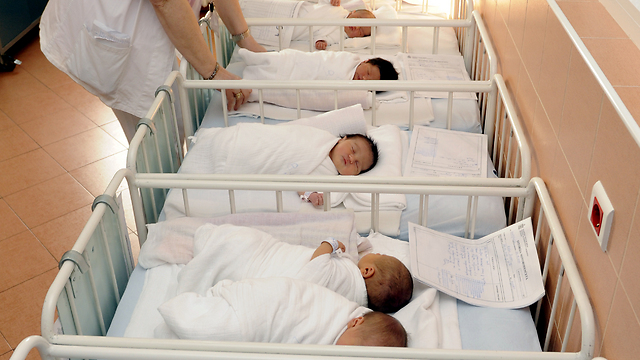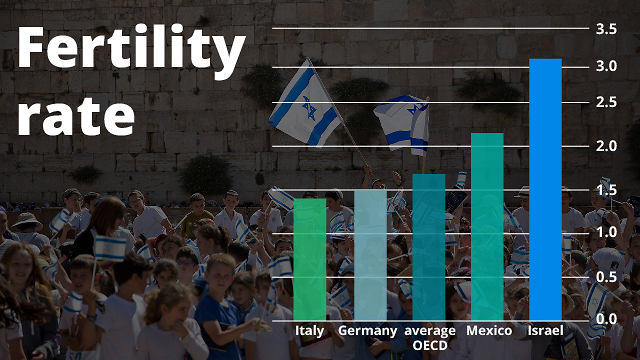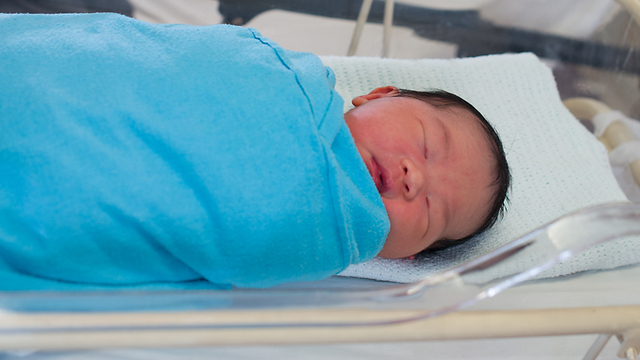
Stats show Israel has highest fertility rate in the West
Average number of children per mother in Israel stands at 3.11 in 2016, the highest of all OECD countries, latest Central Bureau of Statistics data shows; Predominantly-Haredi Modi'in Illit has highest average of children with 7.59, whereas Muslim women have highest fertility rate.
The average number of children per mother in Israel is the highest in the West, and was found to be 3.11 children in 2016, according to Central Bureau of Statistics data on birth and fertility published Tuesday.
In most Organization for Economic Cooperation and Development (OECD) countries, it was noted, total fertility rates in recent years were less than 2.1 children per mother, lower than the rate necessary to keep the population from shrinking.
The highest fertility rate in 2016 belonged to Muslim women—3.29 children per mother—and the lowest to women whose religion was not classified by the census—with 1.64 children. The latter group is comprised mostly of spouses of Jewish olim (immigrants) and those whose religions are not separately noted, such as Buddhists, Hindus, Samaritans and the like.
When examining the data by community, segmenting by cities containing 10,000 residents or more, the highest 2016 fertility rate was found in the Haredi city of Modi'in Illit, with 7.59 children on average per mother, whereas the lowest was found in Kiryat Tiv'on, with 1.91 children.
Communities with highest overall fertility rates were Haredi cities and Bedouin communities in the south. Those with the lowest rate, on the other hand, were mostly Druze, or communities housing either the upper socioeconomic echelons of Israel's population or a relatively high percentage of olim.
Israel's overall fertility rate was 3.14 children per mother—the same rate measured in 1980. An uptick in fertility rates began in 2006 following a surge in Jewish women's fertility rates, reaching the 2016 rate of 3.14 despite a drop in Muslim, Christian and Druze women's fertility rates.
Precisely 191,405 babies were born in 2016, 139,400 (76.8%) of whom were born to Jewish women and those of other religions except Islam. The remainder were born to Arab women. Split by gender, 51.5% of babies were male.
By religion, 73.9% of babies born in 2016 were born to Jewish women, 20.7% to Muslims, 1.4% to Christians, 1.3% to Druze, and 2.6% to women whose religion was not classified in the census.
The proportion of babies born to women 30 years or older rose from 40.2% in 2000 to 51.5% in 2016. Putting off births until age 30 is a prevalent trend among many developed countries. In Ireland, the Netherlands, Spain and Italy, for instance, mothers' average age when giving birth soared past 30 in the mid-nineties.
The average age of women giving birth for the first time, meanwhile, was 27.6, with the average age of a second child two years later and the age for a third child two years after that.
A relatively sharp rise in the mother's average age at birth has also been recorded starting in 2000, rising by a year and five months and reaching 30.4 in 2016. Most of the increase can be attributed to women putting off their first birth well into their late twenties, from 25.7 in 2000 to 27.6 in 2016, as well as to the tendency to give birth after age 30.
Examining multifetal births, 4.6% of all babies born in Israel in 2014 were born in such births. Ninety-seven percent of those babies were twins. Due to the increase in in vitro fertilization treatments in Israel starting in the nineties, a similar increase was noted in multifetal births.
The increases positioned Israel as one of the country's with the highest percentage of multifetal births in the world. In 1995, 3.8% of all babies born in Israel were part of multifetal births, compared to merely 2.4% in 1980. Starting in 2000, the rate stabilized in the vicinity of the current portion.













